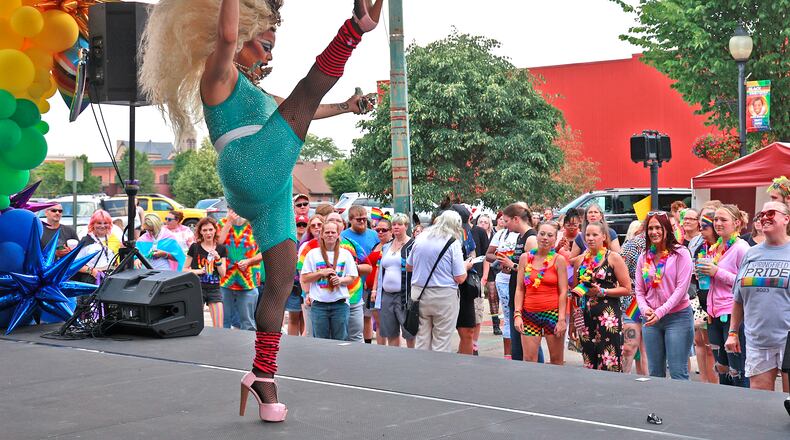The change would restrict certain drag events to bars and other spaces where minors are prohibited.
Bradley Minerd, president of Equality Springfield, said the group “vehemently opposes” the bill.
It discriminates against transgender and gender nonconforming people, Minerd said, “perpetuating harmful stereotypes and further marginalizing vulnerable communities.”
The bill is co-sponsored by several Republicans, including two who represent Clark County: Bernie Willis (R-Springfield) and Bill Dean (R-Xenia).
“It doesn’t mean all performances,” Rep. Josh Williams, R-Sylvania, said. “A man dressed as a woman reading a book is constitutionally protected speech. But I’ve seen videos of performances here in the state of Ohio and across the nation that are improper to be done in the presence of minors.”
Drag queens and kings would face charges if local prosecutors decided their performances were obscene or harmful to juveniles as defined by Ohio law.
Obscene performances are defined as those where the show’s “dominant” or primary purpose is to arouse lust by depicting sexual activity, sexual excitement or nudity. And if a drag queen or king was convicted under HB 245, they would be facing a first-degree misdemeanor at minimum.
If a minor saw their show, the performer could face a first-degree misdemeanor. If the performance was deemed obscene, the charge would be a fifth-degree felony.
If a minor younger than 13 was at an obscene performance, that charge would climb to a fourth-degree felony, which carries a maximum prison sentence of 18 months.
Minerd said by expanding the definition of adult cabaret performers to any entertainer with a gender different than the one assigned to them at birth, it forces drag events to be limited to bars and places in which minors are not allowed.
“Drag queens and kings have been an integral part of diverse communities, promoting acceptance, love and self-expression,” Minerd said. “Labeling their performances as obscene or harmful to juveniles based on subjective interpretation by local prosecutors is an infringement on their artistic freedom and violates their right to expression.”
Equality Springfield is an organization “dedicated to equality, diversity, and social justice,” he said, adding, “We call on Ohio lawmakers to reject House Bill 245.” “We urge them to protect the rights and freedoms of all individuals, regardless of their gender identity, and foster an environment where everyone can express themselves authentically and without fear of persecution.”
What is an obscene performance?
Performing in drag was popular during the Shakespearean era (late 1500s) when women weren’t allowed to act on stage. A handful of drag queens like Dame Edna Everage achieved notoriety in the centuries since, but it wasn’t until the Emmy Award-winning show “RuPaul’s Drag Race” launched in 2009 that drag culture really entered the modern mainstream.
Drag queen story hour was created in 2015, and the backlash against the concept soon followed.
Conservative writers and pundits called these events inappropriate at best, claiming their purpose is to sexually groom children. And while Williams was clear that not all drag is inherently obscene, he believes there are performers who behave inappropriately.
That’s why he and 42 other Republicans think HB 245 is necessary. Williams said it will “put the power and the discretion in the hands of law enforcement officials” to decide whether individual shows or events were “harmful to juveniles.”
The Ohio Revised Code defines that harm as “any material or performance describing or representing nudity, sexual conduct, sexual excitement, or sadomasochistic abuse” where the following conditions are met:
- Appeals to the “prurient” or excessive interest of juveniles in sex.
- Offensive to “prevailing standards in the adult community” about what is suitable for children.
- Lacks serious literary, artistic, political, and scientific value for children.
What’s happening in other states?
Ohio isn’t the first state to consider a ban on public drag performances. Lawmakers in at least eight other states have introduced similar legislation.
Tennessee Republicans banned public drag performances in March, but a U.S. district judge overturned it in June saying the law violated the First Amendment right to freedom of speech.
Williams, who is an attorney himself, said he crafted his legislation with that in mind.
“This is the most narrowly tailored bill on this subject matter in the nation,” he said.
LGBTQ groups don’t see it that way, saying HB 245 is “censorship over safety.”
“There have been multiple documented incidents of self-identified Nazis showing up to performances in Ohio in the past nine months. The Department of Homeland Security has sent out multiple alerts indicating the growing threat of hate crimes against LGBTQ+ people,” Equality Ohio policy director Maria Bruno said in a statement. “Yet instead of addressing guns, targeted intimidation, or any of the escalations of violence that we are seeing in our communities, Ohio’s statehouse politicians instead have chosen to broadly criminalize performing arts.”
